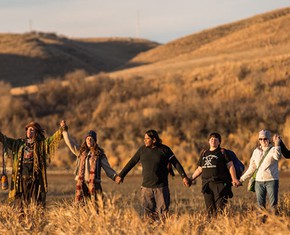The views expressed in our content reflect individual perspectives and do not represent the authoritative views of the Baha'i Faith.
The noble human desire to help our brothers and sisters is alive and healthy – just look beyond the headlines and you will find a mighty river of generosity flowing towards the needy, poor, and sick.
This global philanthropic movement, happening in places close to home and in the far corners of the planet, is so vast and enduring that it boggles the mind. The wealthy, the middle class, and the poor are all part of this phenomenon, and the world’s Baha’is play a large part in it, connected with all like-minded citizens in building a just world order. You can join it – all it takes are selfless deeds.
Philanthropic deeds can help us obtain “merciful gifts and powers” in our lifelong spiritual journey. A philanthropic mindset always starts with one deed – the simple act of doing something kind, like performing a task or achieving a goal for someone else in a measurable, concrete way. Baha’u’llah said “Let deeds, not words, be your adorning.”
RELATED: Bringing a New Era of Humanity Into Being
Through such actions, whether daily chores, service to others, or your occupation, your character is reflected through the deeds you perform. If you simply do or say nothing, no one, including yourself, will know your true capacities. When we do things with pure motives for others, it gives us confidence and adds to our treasure house of experience.
More importantly, our deeds can serve as a measure of our capacities. When we take action, even our failures have value, giving us opportunities to improve our skills. Imagine a one-year old learning how to walk. At first the child may hold an adult’s hand or hang on to furniture as she tries to walk. She falls often, but the day comes when she achieves balance and strength and gains the ability to confidently stand on her own. In the same way, repeated effort is the only way to increase self-knowledge. Moreover, deeds are not undertaken: they grow out of and interact with other aspects of our inmost being, such as knowledge, love and faith.
For example, suppose you want to learn how to swim, which I did when I was forty years old.
Ultimately, there is no way to learn to swim other than getting into the water and practicing the basic skills required. But just getting into the water can be a challenge. Often people who can’t swim fear the water and don’t trust their own abilities. So learning to swim is also about trusting yourself and your teacher, and about developing faith and confidence that you can safely enjoy your time in the water. Without this faith, it is hard to learn much of anything. With it, a love of the water often blossoms, and through practice and perseverance, you will learn how to float, breath properly, and move your arms and legs in concert. In short, you will become a swimmer! Knowledge, love, faith, and action come together to make this happen.
Or consider the example of Terry Fox, a Canadian suffering from bone cancer who decided to embark upon a unique challenge. On April 12th, 1980, he began his “Marathon of Hope” by dipping his artificial foot into the Atlantic Ocean, with one strong leg and one prosthetic limb limping along the way, his aim was to cross the vast continent of North America coast to coast to raise twenty-four million dollars. On average, he walked about forty-eight kilometers a day.
His brother, who accompanied him, was astounded by Terry’s determination. Terry was in constant pain, yet he kept moving forward, propelled by his spirit of hope and faith in finding the cure for cancer. After 5,373 kilometers, halfway through his journey, the cancer spread to his lungs, cutting short his life and his goal. His spirit, however, stayed forever. Today, his heroic perseverance is commemorated through numerous awards, research grants, and an annual fund-raising run held in 60 countries in his name. His short life, filled with sacrifice, courage, and a positive attitude, inspired millions. With love for others and faith in himself, he started a journey of hope. Terry Fox recreated himself, transforming a man with a fatal disease into a vision of hope for others.
Terry Fox is a great example of how, when moved by the spirit, even physical pain and suffering cannot prevent us from extraordinary achievement. Actions speak louder than words. In the Baha’i Faith, idle talk is very much discouraged. Prayer and meditation alone are not enough to discover the true self; one must engage in action. Baha’u’llah gave a stern warning about lack of action in one’s life with these words: “The essence of faith is fewness of words and abundance of deeds; he whose words exceed his deeds, know verily his death is better than his life.”
RELATED: The Content of Our Character: 3 Steps to Improving as Adults
The Baha’i teachings say that we should not confine our deeds to helping only ourselves or our immediate families. We must adopt a global consciousness. This means regarding humanity as one family. It means taking responsibility for being a member of this family. On a planet of billions of people, our good deeds can reach out to embrace those in any town, any country, any continent, wherever there is a need. This openness is another great phenomena of the age we live in.
What deeds are acceptable in the sight of God? In the following beautifully-written passage from his writings, Baha’u’llah tells us:
Be generous in prosperity, and thankful in adversity. Be worthy of the trust of thy neighbor, and look upon him with a bright and friendly face. Be a treasure to the poor, an admonisher to the rich, an answerer of the cry of the needy, a preserver of the sanctity of thy pledge. Be fair in thy judgment, and guarded in thy speech. Be unjust to no man and show all meekness to all men. Be as a lamp unto them that walk in darkness, a joy to the sorrowful, a sea for the thirsty, a haven for the distressed, an upholder and defender of the victim of oppression. Let integrity and uprightness distinguish all thine acts. Be a home for the stranger, a balm to the suffering, a tower of strength for the fugitive. Be eyes to the blind, and a guiding light unto the feet of the erring. Be an ornament to the countenance of truth, a crown to the brow of fidelity, a pillar of the temple of righteousness, a breath of life to the body of mankind, an ensign of the hosts of justice, a luminary above the horizon of virtue, a dew to the soil of the human heart, an ark on the ocean of knowledge, a sun in the heaven of bounty, a gem on the diadem of wisdom, a shining light in the firmament of thy generation, a fruit upon the tree of humility.
I have read this passage many times throughout my life. At different times, different parts resonate with me. How about you?
















Comments
Sign in or create an account
Continue with Googleor